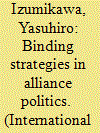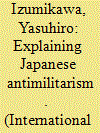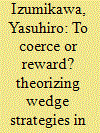|
|
|
Sort Order |
|
|
|
Items / Page
|
|
|
|
|
|
|
| Srl | Item |
| 1 |
ID:
158689


|
|
|
|
|
| Summary/Abstract |
In the mid-1950s, the Soviet Union used a wedge strategy aimed at weaning Japan away from the United States. While the effort failed, this was far from an inevitable outcome. At the time, the Japanese government publicly expressed its intention to improve relations with the communist bloc. Moreover, Moscow offered Tokyo attractive carrots, mainly in the form of a favorable resolution of outstanding territorial disputes. I argue that the failure stemmed from how the United States deployed binding strategies—policies aimed at maintaining or enhancing an ally's loyalty—to counter Moscow's overtures. In doing so, I seek to expand our understanding of binding strategies and the dynamic interplay between binding and wedge strategies. To this end, I present a typology of binding strategies and develop a theory that encompasses dynamic interactions between binding and wedge strategies. I then test the theory with the case of the Soviet-Japanese-US triangular diplomacy and demonstrate that the two strategies are deeply intertwined and should be analyzed as such. I conclude by discussing broader theoretical implications, such as the possibility of developing a dynamic theory of alliance politics.
|
|
|
|
|
|
|
|
|
|
|
|
|
|
|
|
| 2 |
ID:
098662


|
|
|
|
|
| Publication |
2010.
|
| Summary/Abstract |
Since the late 1990s, Japan has sent increasing numbers of its military forces overseas. It has also assumed a more active military role in the U.S.-Japan alliance. Neither conventional constructivist nor realist approaches in international relations theory can adequately explain these changes or, more generally, changes in Japan's security policy since the end of World War II. Instead, Japan's postwar security policy has been driven by the country's powerful antimilitarism, which reflects the following normative and realist factors: pacifism, antitraditionalism, and fear of entrapment. An understanding of the influence of these three factors makes it possible to explain both Japan's past reluctance to play a military role overseas and its increasing activism over the last decade. Four case studies-the revision of the U.S.-Japan Security Treaty in 1960, the anti-Vietnam War period, increases in U.S.-Japan military cooperation during détente, and actions taken during the administration of Junichiro Koizumi to enhance Japan's security profile-illustrate the role of antimilitarism in Japan's security policy. Only through a theoretical approach based on analytical eclecticism-a research strategy that considers factors from different paradigms-can scholars explain specific puzzles in international politics.
|
|
|
|
|
|
|
|
|
|
|
|
|
|
|
|
| 3 |
ID:
175077


|
|
|
|
|
| Summary/Abstract |
Why did the so-called hub-and-spokes alliance system emerge in East Asia after World War II instead of a multilateral alliance? Realists and constructivists offer various explanations, pointing to such factors as the United States' preference for bilateral alliances, the absence of a collective identity, and historical memories of Japanese imperialism. None of these explanations is satisfactory, however. Indeed, the historical record reveals that the United States sought a multilateral alliance in East Asia until the early 1960s. A theoretical model based on a social exchange network approach explains how a specific form of network can develop among potential allies. In East Asia, three U.S. allies—Japan, South Korea, and Taiwan—contributed to the emergence and shape of the hub-and-spokes system, which came into being as an unintended consequence of their interactions. The preferences and behavior of these allies proved at least as consequential as those of the United States in shaping this system. The implications of this finding could be significant for alliance politics in contemporary East Asia.
|
|
|
|
|
|
|
|
|
|
|
|
|
|
|
|
| 4 |
ID:
080146


|
|
|
|
|
| Publication |
2007.
|
| Summary/Abstract |
This article addresses why small powers initiate aggressive bargaining with great power allies and adversaries despite the risk of provocation. Although the cause of such behavior is usually attributed to the regime type or the "irrationality" of an aggressive small power, this article explores how a system-level factor affects incentives for a small power to conduct aggressive bargaining. In so doing, I develop a theory of asymmetric aggressive bargaining, which shows that a small power's high security dependence upon its ally or adversary makes its use of aggressive bargaining rational. The empirical analysis suggests that the proposed theory effectively explains changes in North Korea's policies toward the United States and the Soviet Union after the Korean War
|
|
|
|
|
|
|
|
|
|
|
|
|
|
|
|
| 5 |
ID:
123397


|
|
|
|
|
| Publication |
2013.
|
| Summary/Abstract |
Wedge strategy, a policy of preventing or dividing an adversary coalition, has been attracting increasing scholarly attention. In particular, Timothy Crawford has articulated the concept and claims that reward-based strategies are more effective than coercive strategies that actually strengthen the ties between enemies. Although this sounds logical, history provides sufficient cases that contradict the claim. Why? To answer the question, I develop a theory of wedge strategy by utilizing the concept of reward power. I then argue that although countries seeking to divide adversary coalitions usually prefer reward-based strategies, they turn to coercive measures when a divider state perceives grave threats as a result of a target state's strong alignment with its primary enemy but does not have sufficient reward power to split the adversaries. I examine this theory through two case studies of us wedge strategies toward the Sino-Soviet alliance during the early Cold War period. This article addresses the specific puzzle of choices between reward and coercive wedge strategies and offers broader theoretical implications regarding the utility of the concept of reward power in international and alliance politics.
|
|
|
|
|
|
|
|
|
|
|
|
|
|
|
|
|
|
|
|
|